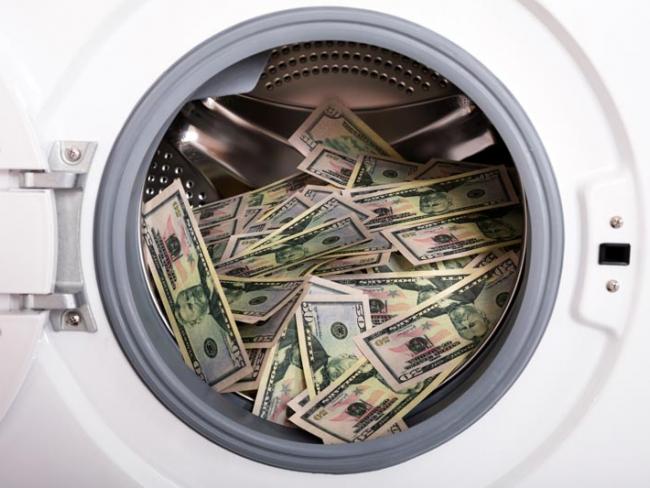
Dollars are a preferred currency for money laundering. Photo Andrey Popov/shutterstock.com.
A new book reveals just how corrupt Britain has become when it comes to international money laundering…
Butler to the world: how Britain became the servant to tycoons, tax dodgers, kleptocrats and criminals, by Oliver Bullough, hardback, 288 pages, ISBN 978-1788165877, Profile Books, 2022, £20. Kindle and eBook editions available; paperback edition due January 2023.
Based on extensive research and many interviews, this amazing book exposes the role of successive British governments in aiding and abetting a huge range of criminal acts.
Journalist Oliver Bullough has produced a worthy and readable follow up to his earlier book, Moneyland: why thieves and crooks now rule the world and how to take it back. That described how a global elite operate beyond the law and outside the control of nation states.
This book extends the theme, to show how Britain facilitates that world. Bullough writes, “It’s not just that Britain is not investigating the crooks, it’s helping them too.” And he notes that Britain’s clients are “some of the worst people in existence.”
Britain does not act alone in helping kleptocrats and criminals to launder money. Bullough points out that their activities naturally transcend national jurisdictions. They derive power and resilience because they do not rely on any one place.
But, he goes on, “however bad other countries are, Britain has for decades been worse. It operates as a gigantic loophole, undercutting other countries’ rules, massaging down tax rates, neutering regulations, laundering foreign criminals’ money.”
Criminality has become an integral part of global capitalism. The free movement of capital facilitates the growth of crime, not the useful, real economy. Britain facilitates this in a range of activities, not all of them illegal.
The author traces this back to the financial aftermath of the 1956 Suez crisis. City bankers, no longer able to use sterling to fund their international trade, hit upon using the large deposits of US dollars held offshore and outside the US banking system – which became known as eurodollars.
Bullough explains the attraction, “By basing themselves in London, [bankers] avoided US restrictions on how much interest they could pay; by using dollars, they avoided British restrictions on how much money they could move”.
London became the centre for this global financial market serving the needs of capital. Other roles grew around that activity – accountancy and law, and even public relations and art dealing.
The free movement of capital destroys industry which is vital to our existence. “If you have free capital flows and fixed exchange rates, you can’t have domestic autonomy, because the markets will severely punish what they deem to be excessive expenditure by making borrowing prohibitively expensive.” But free capital flows eventually destroy fixed exchange rates. Speculative capital destroys productive capital.
With free movement of capital, exploitation intensifies. The accounting giant PwC and the banking giant UBS reported that between April and July 2020, the world’s 2,189 billionaires increased their collective wealth by $2.2 trillion.
They then claimed, as Bullough recounts, that “it would not be effective to tax the billionaires, who could just move their money out of the reach of national tax authorities. Instead, governments should just allow inflation to increase, to erode what savings the rest of us have left, because that is the money that can be reached.”
This liberal, transnational approach extends beyond finance. It not only impoverishes workers by diverting the wealth they create, it can also directly damage our society.
Crime and capitalism
Successive capitalist governments have let big crime run its own affairs. For example, in 2003, the Labour government allowed the gambling “industry” to regulate itself. Its Better Regulation Task Force said, “We would urge you to consider self-regulation, such as a code of practice endorsed by the industry.”
Bullough shows how the industry promptly brought in fixed-odds betting terminals. “As with casino roulette, the machines are mathematically rigged in favour of the house. … if you play for long enough, and the machines are designed to make sure you do, the bookie always wins. They are a one-way bet. By 2007 there were 30,000 of them in Britain’s betting shops.”
“Financial crime…however bad other countries are, Britain is worse…’
The author points out, “Inevitably, the big companies put their betting shops in places where punters could be relied upon to lose as much money as possible. This was predation on the most vulnerable members of society by huge corporations armed with ever more finely honed addictive machines. There was a direct correlation between the concentration of betting shops and the level of deprivation in a district.”
The amount of money gambled online in Britain increased from £13 billion in 2014 to £121 billion in 2019, while the bookmakers’ profits rose from £1.5 billion to £5.5 billion. YouGov research estimates 1.4 million people are now “experiencing gambling harms”. The government’s terminology – “problem gamblers” – blames the victim. The reality is problem companies, empowered by problem governments.
And what of anti-money laundering regulations and the recent Economic Crime Act? The primary responsibility to detect money laundering lies with a patchwork of self-regulating organisations, laughably called “light touch” regulation and which has failed on many other scores. And the National Crime Agency, responsible for enforcement, is underfunded and outgunned by the expensive lawyers they face.
Bullough sums up, “The government has essentially outsourced responsibility for stopping money laundering to the money launderers, and is failing to stop dirty money as a result.”
The first part is true, the second is not. Successive governments have not failed to stop this criminality because they have never tried to stop this criminality. They have enabled it because they profit from it. In capitalism, capital is king, profit alone is sovereign.
